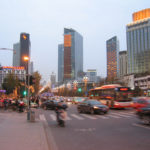Search Results
Three billion hours per week are spent playing online games worldwide. Though the prevalence of online games has drawbacks, what if some of this time spent gaming could improve the way our cities are designed? The prevalence of games in ...

Tuesday’s U.N. Climate Summit included unprecedented focus on cities and the transport sector at climate change conferences. City leaders committed to new actions to promote sustainable urban development and low carbon transport systems. Notable leaders at the Summit included Seoul Mayor ...

This is the fifth entry in the Urbanism Hall of Fame series, exclusive to TheCityFix. This series is intended to inform people about the leading paradigms surrounding sustainable transport and urban planning and the thinkers behind them. By presenting their many ...

The concept of smart, connected transport is a hot topic among city leaders looking to ride the wave of innovation to more sustainable, prosperous cities. Despite this, building a truly smart and interconnected urban transport system is more than most ...

On the first Sunday in September, 2014, cities across Bolivia closed their roads for the fourth annual “Day of the Pedestrian and Cyclist in Defense of Mother Earth.” The event, often referred to simply as the “Day of the Pedestrian,” is an ...

If your ‘Don’t Walk’ traffic signal was replaced with a dancing stick figure, would you be less likely to impatiently cross the street on a red light? At a busy intersection in Lisbon, smart switched the traditional crosswalk symbol with ...

Climate action often focuses on energy and industrial activity, but the transport sector must be included to keep global warming below the dangerous two-degree scenario. Transport is responsible for 22% of energy-related greenhouse gas (GHG) emissions worldwide, and its emissions ...

Update: 9/22/2014: The People’s Climate March on Sunday, September 21, 2014 included more than 400,000 participants in New York City alone, making it the largest climate march in history. In total, 160 marches occurred globally with another 2,800 solidarity events in 166 countries. Organizers plan to continue these ...

No strategy for reducing the impacts of global climate change is complete without addressing the challenge of urbanization. Cities contribute about 70% of energy-related greenhouse gas (GHG) emissions, despite only accounting for 2% of global land area. Reducing this environmental impact may ...

Road safety issues have reached a pinnacle in Indian cities. In 2013 alone, 140,000 people died in traffic crashes, and many more were severely injured. These premature deaths and debilitating injuries put an intense burden not just on families and ...

Chennai, India has long been notorious for its lawless auto-rickshaw drivers. On August 25, 2013, the Tamil Nadu state government sought to change this perception by reforming rickshaw fare structures for the first time in 17 years. The government was ...

City leaders have a key role to play at next week’s UN Climate Summit in New York City, which brings together heads of state, mayors, business leaders, and civil society representatives to build momentum towards an international agenda to tackle ...

By 2050, the world’s population is estimated to grow to 9.6 billion, with 66% living in cities. How can we accommodate urbanization while avoiding costly urban sprawl that can lead to unequal access to transport and increased greenhouse gas emissions? ...

Foreword: The upcoming United Nations Climate Summit comes at a critical time for cities worldwide. Cities already account for 70% of global greenhouse gas (GHG) emissions, and between 2011 and 2030, urban areas are expected to gain 1.4 billion people. ...

Lagos – the largest city and commercial capital of Nigeria – has traditionally struggled with a lack of reliable mass transit systems and severe traffic congestion. The average Lagos commuter spends over three hours in traffic every day. More recently, ...

Page 86 of 228« First...1020...858687...90100...Last »






















